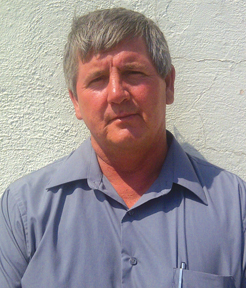
By a narrow margin, Cyril “Whitey” Scott has unofficially been elected to serve as the Rosebud Sioux Tribe’s president following its general election Aug. 23. Scott is poised to replace the unprecedented seven-year administration of Rodney Bordeaux. Barring any formal challenges, the results will be declared official by the tribe’s election board on Aug. 31. PHOTO COURTESY GABRIELLE HAUKAAS
Scott ready to lead
Bordeaux’s three-term run set to end
By Jesse Abernathy
Native Sun News Editor ROSEBUD — A new president has unofficially been voted into office in the Rosebud Sioux Tribe’s general election. By a narrow margin of 39 votes, Cyril “Whitey” Scott is set to replace three-term incumbent Rodney Bordeaux. Scott received 1,277 votes, or 50.78 percent of the total number of votes (2,515), to Bordeaux’s 1,238 votes, or 49.22 percent of the total number, in the Sicangu (Burnt Thigh) Lakota’s general election Aug. 23, according to the tribal election board’s final tally, which was formally made public Aug. 27. The unofficial win for Scott is nothing short of an upset for Bordeaux, who has held the top spot since 2005, making him one of the longest-serving, as well as one of the longest consecutive-serving, presidents in the tribe’s post-1934 history. 1934 was the year the federal government returned some semblance of self-governance to Native American tribes via the congressionally-sanctioned Indian Reorganization Act, which was initiated by John Collier Sr., then-commissioner of the Bureau of Indian Affairs. Additionally, Scott’s tentative victory over Bordeaux wasn’t indicated by the RST’s primary election last month. In that preliminary race, Scott received 593 votes, while Bordeaux garnered 787 votes – almost 200 more votes than Scott, who was his closest contender. Scott says he’s ready to take the oath of office as president. “I feel good,” he said Aug. 27 of his lead in the general election. “(My administration) will do some tremendous things here” on the Rosebud Reservation, he added with a jubilant laugh. Friday, Aug. 31, at 1 p.m. CDT is the deadline for any qualified voter, including tribal council candidates who didn’t receive a majority of the vote for their respective offices, to officially challenge the results of the general election. Barring any formal challenges, Scott will be certified the winning candidate for the office of president by the Rosebud Sioux Tribe Election Board immediately following the deadline. The rest of the majority vote-getters in each respective general election race also will be certified as winning candidates on Aug. 31 in the absence of any formal challenges. On Tuesday, Sept. 4, newly-elected tribal council members, who will each serve three-year terms, will be sworn into office by election board officials. For the office of vice president, incumbent William “Willie” Kindle, who has held the vice presidential seat since 2007, received 1,720 votes, while challenger Oliver J. “OJ” Semans Sr. received 801 votes, just under half as many as Kindle. Voters also cast ballots for community representatives from nine of the reservation’s 10 geopolitical districts. Following a term-limit challenge hearing Aug. 14, the Antelope District’s top vote-getter in last month’s primary election, incumbent Scott Herman, voluntarily withdrew as a candidate in the general election. As a result of Herman’s withdrawal, the election board opted to hold another election Thursday, Sept. 20, specifically for the office of Antelope District representative. The nine tribal members who originally ran against Herman last month for the Antelope District seat, including Calvin “Hawkeye” Waln, who received 487 votes to Herman’s 545 votes, will all be put back on the ballot Sept. 9 for the special election on Sept. 20, according to Cecelia Fast Horse, election board sergeant-at-arms. In a near repeat of last month’s primary election, well less than half of the tribe’s registered voters turned out for the general election: Of the 6,665 enrolled tribal members 18 years and older registered to vote on the Rosebud Reservation, 2,538 – or 38 percent – of them showed up at the polls this time around, according to official election board numbers. This figure is up slightly from the 2,269 tribal members, or 34 percent of all voters, who showed up for the primary election on July 26. In addition to Fast Horse, the tribe’s election board includes Sam High Crane, chairman; Rhonda McKenzie, vice chairwoman; Ronald Valandra, treasurer; and Patricia “Patti” Romero, secretary. (Contact Jesse Abernathy at editor@nsweekly.com)
Join the Conversation